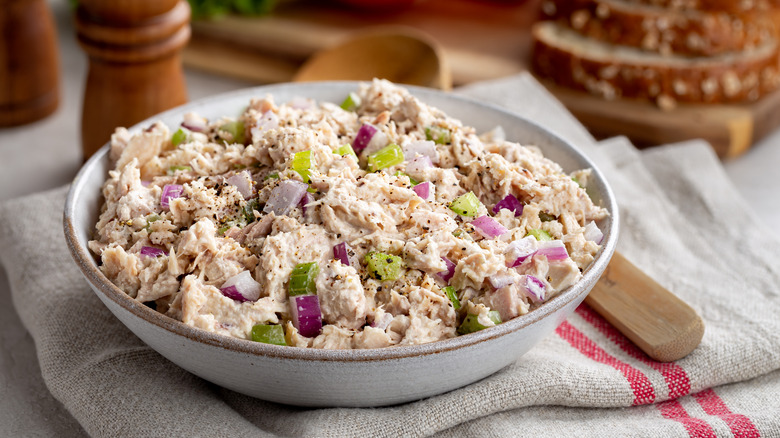How Long Can You Store Homemade Tuna Salad In The Fridge?
Tuna salad is flavorful, nutrient-rich, and its minimal prep time makes it a great option for us busy folks. It's also versatile, with plenty of ingredients to add if you want to punch up your tuna salad, or just need to give tuna salad a little extra crunch. But if you're wanting to make this salad ahead of time, or have some leftovers, you might start questioning how long a tuna salad can last. So here's your answer: When stored correctly, you have about three to five days, according to the FDA, before things get 'fishy'.
The best way to store your tuna salad is to refrigerate it in an airtight container. Once you've made it, don't let it sit around at room temperature for more than two hours as the temperature between 40 and 140 degrees Fahrenheit is considered a 'danger zone' (per the USDA); in other words, bacteria can grow and spoil your salad if it's not kept refrigerated below 40 degrees Fahrenheit. Keeping your salad airtight is also important to making it last longer, since this keeps the bacteria far away from your beloved dish.
How to keep your tuna salad fresh for longer
Apart from keeping it airtight and refrigerating it immediately (or at least within two hours), there are a few other ways to keep your salad fresh. Always store it towards the back of your refrigerator, as this is the coldest part of the fridge with the most stable temperature. It's also best to use ingredients that are at peak freshness rather than close to expiry. Not only is this important for taste, but it will also ensure that your salad doesn't go bad the next day.
An acidic component in your salad like lime juice or vinegar will work as a natural preservative, since bacteria doesn't grow so well in acidic environments. You could use it as a mayo swap to make tuna salad more flavorful. And labeling your container with the date the dish was made is also a great way to keep track of how long it's been in the fridge.
But even if you've done all the right things, your salad might still go bad before this time frame, so always check for signs of spoilage before eating. A bad smell, mold, or sliminess all mean that it should go straight in the bin instead of your mouth. Anyway, we'll take this as a sign to never say no to a second bowl of fresh tuna salad.

